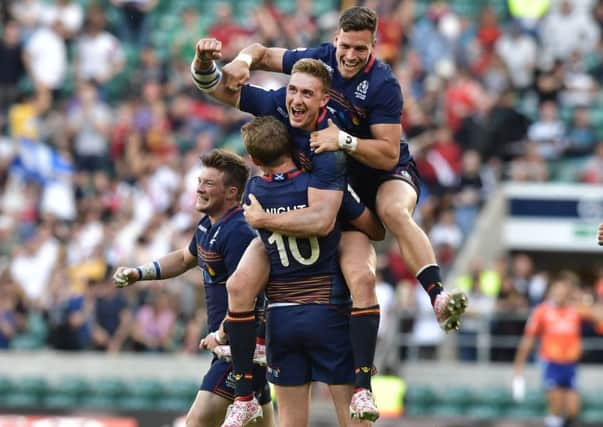Second helping of Twickenham glory for Scotland Sevens


The Scots did it the hard way, beating the host nation in the Twickenham final, and they carved out a little bit of history in the process.
The eventual winners faced New Zealand in the quarter-finals, fully aware that no Scotland team, in sevens or the 15-man game, had ever beaten the mighty All Blacks. Trailing 21-0 at half-time it seemed like that sorry statistic had the shelf life of atomic waste.
Advertisement
Hide AdAdvertisement
Hide AdBut this Scotland squad have oodles of self belief. They kept playing and clawed their way back into contention.
The momentum of the match changed and winger Jamie Farndale scored two tries, the second of which came after the hooter and sealed a famous 24-21 fightback for the Scots.
The Scots faced the USA Eagles in the semi-final and squeezed past them despite a brace of tries from the outstanding Perry Baker, the fastest man in rugby. George Horne was the hero of the hour after knocking the ball from one American’s grasp after he was over the Scottish try line to prevent one score.
That victory set up a final against the host nation who, incidentally, fielded a Scot in their ranks, Ruaridh McConnochie, who is a product of proud Scottish parents and London Scottish.
England’s speed man Dan Norton scored a scorcher of a solo try in the first half to give the home team the advantage. But Hugh Blake struck back after the break after England’s players stopped, expecting a knock-on decision, only for referee Craig Joubert to signal that an English hand had ripped the ball backwards out of Mark Robertson’s grasp. Perhaps the South African felt obliged to give one close call to the Scots after that howler in RWC’15.
The game was a cat-and-mouse affair but the Scots managed to keep the opposition’s main threat Norton in his box with James Fleming making more than one crucial tackle. England came close and would have scored in the corner but for some frantic defensive work from Blake and eventually a break by Scott Wight led to skipper Scott Riddell barrelling his way over the line from short range, sent on his way with a perfect pass from Robertson.
The Scots saw out a nervous final minute without too many alarms, Farndale running the ball out of play after the hooter.
Wight and Robertson retire from the game they have graced and coach Callum MacRae, who has worked miracles in turning Scotland from laughing stock into world beaters, moves to Edinburgh Rugby. It is the end of an era and Robertson, who won the Player of the Final, reflected on what it meant to him.
Advertisement
Hide AdAdvertisement
Hide Ad“As a Scotland player you go through tough times,” said Robertson. “You know that the team has heaps of potential but it is only rarely that you get to fulfil that.”
MacRae said: “I’m hugely proud of the players and the manner in which we got over the line today.
“Beating New Zealand in the manner that we did and our second-half performance in the final were extremely pleasing.
“If you’re a hard team to beat you’re always going to have an opportunity to win. We know we can score tries but this cup was won by the way we defended today.”
Japan were relegated out of the HSBC series, South Africa topped the pile at the end of the season and the Scots finished seventh in the overall table after a season that was blighted by injury to several of their core sevens players. At least this squad went out at the top after a memorable victory in West London.